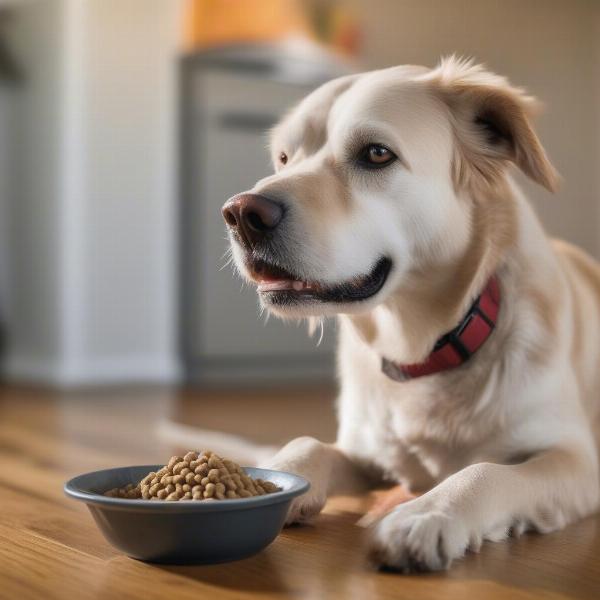Losing weight in a senior dog can be a worrying sign for any owner. While some weight loss can be a normal part of aging, it’s crucial to understand the underlying causes to ensure your furry friend stays healthy and happy in their golden years. This article will explore the potential reasons why your senior dog is losing weight and provide actionable steps to address this issue.
Why is My Senior Dog Losing Weight?
Several factors can contribute to weight loss in older dogs. Some are relatively benign, while others can indicate more serious health concerns. Identifying the cause is the first step toward providing the right care. Common reasons include:
- Dental Problems: As dogs age, dental disease becomes more prevalent. Painful teeth and gums can make chewing difficult, leading to decreased food intake.
- Decreased Appetite: Changes in a senior dog’s sense of smell and taste can lead to a reduced interest in food. This can be due to normal aging or underlying medical conditions.
- Kidney Disease: Kidney disease, a common ailment in older dogs, can cause nausea and decreased appetite, resulting in weight loss.
- Cancer: Unfortunately, cancer can affect dogs of all ages, and weight loss is often a symptom.
- Diabetes: Like kidney disease, diabetes can cause increased thirst and urination, accompanied by weight loss.
- Hyperthyroidism: An overactive thyroid gland can boost metabolism, leading to weight loss even if the dog is eating normally.
- Inflammatory Bowel Disease (IBD): IBD can interfere with nutrient absorption, causing weight loss despite a normal appetite.
- Arthritis and Other Painful Conditions: Pain can make it difficult for senior dogs to move around and access their food bowl, leading to reduced intake and subsequent weight loss.
What Should I Do If My Senior Dog Is Losing Weight?
If you notice your senior dog is losing weight, the first and most important step is to consult with your veterinarian. They can perform a thorough examination and recommend appropriate diagnostic tests to determine the underlying cause.
How Can I Help My Senior Dog Gain Weight?
Once your veterinarian has diagnosed the cause of your dog’s weight loss, they can recommend a tailored treatment plan. This may include:
- Dietary Changes: Switching to a more palatable or easily digestible food can encourage your senior dog to eat more. Your vet might recommend a senior-specific diet formulated for older dogs’ nutritional needs.
 Senior Dog Enjoying a Healthy Meal
Senior Dog Enjoying a Healthy Meal - Medication: If an underlying medical condition is causing the weight loss, your vet may prescribe medication to manage the condition and improve appetite.
- Dental Care: Regular dental cleanings and at-home dental care can help prevent and manage dental disease, making eating more comfortable for your senior dog.
- Pain Management: If arthritis or other painful conditions are contributing to weight loss, pain management medications can improve your dog’s mobility and comfort, allowing them to eat more easily.
Why is My Senior Dog Losing Weight But Still Eating?
Sometimes, a senior dog might continue to eat normally but still lose weight. This can be especially perplexing. Potential causes include:
- Malabsorption: The dog’s body might not be absorbing nutrients efficiently due to conditions like IBD.
- Hyperthyroidism: As mentioned earlier, this condition can increase metabolism, leading to weight loss despite normal food intake.
- Diabetes: Even with a normal appetite, diabetes can interfere with the body’s ability to process nutrients, resulting in weight loss.
How Can I Monitor My Senior Dog’s Weight at Home?
Regularly weighing your senior dog at home can help you detect even subtle changes in weight. Use a pet scale or hold your dog while you weigh yourself, then subtract your weight to determine your dog’s weight. Record these measurements to track trends over time.
Conclusion
Weight loss in a senior dog is a significant concern that warrants veterinary attention. By working closely with your veterinarian, you can identify the underlying cause and implement a plan to help your senior dog maintain a healthy weight and enjoy their golden years to the fullest.
FAQ
- How much weight loss is considered significant in a senior dog? Any weight loss of more than 10% of your dog’s normal body weight should be investigated by a veterinarian.
- Can stress cause weight loss in senior dogs? Yes, stress can suppress appetite and contribute to weight loss.
- What are some signs of dental pain in dogs? Signs of dental pain can include drooling, pawing at the mouth, difficulty chewing, and bad breath.
- Are there specific foods I can give my senior dog to help them gain weight? Consult your vet for recommendations on high-calorie, easily digestible foods appropriate for your dog’s specific needs.
- How often should I take my senior dog to the vet for checkups? Senior dogs should generally see a veterinarian every six months for routine checkups.
- Can supplements help my senior dog gain weight? Some supplements might be beneficial, but always consult your vet before giving your dog any supplements.
- Is it normal for senior dogs to sleep more? Yes, it’s common for senior dogs to sleep more than younger dogs.
ILM Dog is a leading international pet website dedicated to providing reliable and practical advice on all aspects of dog care and nurturing. We offer expert guidance on everything from breed selection and health care to training and nutrition. Our aim is to empower dog owners worldwide with the knowledge they need to ensure their canine companions live long, healthy, and fulfilling lives. Whether you’re a seasoned dog owner or just starting your journey, ILM Dog is your trusted source for evidence-based information and practical tips. Contact us today for expert advice: Email: [email protected], Phone: +44 20-3965-8624.